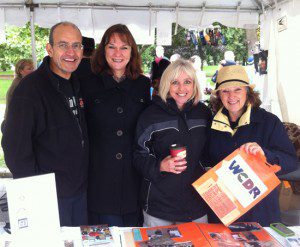
The man approached us with plenty of confidence. He seemed self-assured, but had an inquisitive look on his face too. He pulled out a pen and paper ready to make some notes about who we were. One of us at our booth, on Wellesley Street in Toronto, asked him the burning question of the day:
“Are you a writer?”
“Sure am, “ he said. “I’m a poet. Have been all my life.”
The man then began to tell us that he was based in Brampton, Ont., and that he had written poetry professionally for many years. He said he’d had a few things published. He’d conducted workshops on poetry and was looking for new writing and speaking opportunities.
But he seemed genuinely surprised to see an organization such as ours active, organized and occupying a booth at the “Word on the Street” book festival. As it turned out, writers surprised to be running into other writers around the GTA, was a common experience last Sunday. But this man seemed awestruck that our group, the Writers’ Community of Durham Region, was even on the map.
“We are about 300 writers,” said Cryssa Bazos, the WCDR special events co-ordinator of our booth. Then, because the man still looked a little incredulous, she went on, “There are actually three writers’ communities represented here today at our booth… Durham, Simcoe and York.”
I guess what I found most profound about the moment was that a man as active as a writer as he was – and a poet at that – had no idea that our community of writers even existed. It seemed anathema to him that our group could exist, much less function “out there.”
It seemed odd to me because even if the man believed wholeheartedly in that cliché about writing being the loneliest profession in the world, he must certainly have encountered other novelists, short-story writers, non-fiction writers, essayists, and especially poets on his rounds. It seemed odder still, since the WCDR has been active for nearly 20 years supplying writers of every calibre and genre with survival information, networking opportunities and contact with other writers. Indeed, the mission statement on our homepage states:
“Writing doesn’t have to be a solitary act.”
Indeed, for most of the years the WCDR has assembled writers around Durham region, it has operated on the premise that writers create better material more often if they have access to friendly competition in writing contests; the quality of their fiction or non-fiction improves when they can workshop their writing; and their lonely existence at a keyboard can be more productive if they occasionally gather with like-minded artists.
Thus the WCDR has conducted monthly breakfasts with guest speakers – ranging from agents to Giller and Governor General Awards winners. It has ensured that those seeking experienced guidance can find it in the likes of published WCDR writers Ruth E. Walker, Ingrid Ruthig, Deborah Rankine, Neil Crone, Barbara Kyle, Dorothea Helms (aka The Writing Fairy), Rich Helms, Sue Reynolds and James Dewer, to name a few.
Of all the activities associated with the WCDR, I have a soft spot in my heart for the six years we organized interviews with some of the hottest writers in the country and staged those literary encounters in front of audiences at venues in and around Whitby. Our “Words in Whitby” series put in front of writers and readers such national literary stars as Rabindranath Maharaj, Pierre Berton, Susanna Kearsley, Sandra Birdsell, Richard Wright, Linwood Barclay, David Adams Richards, Wayne Johnston, Charlotte Gray, Wayson Choy, Joy Fielding, Dave Bidini, Robert J. Sawyer and David Gilmour. It wasn’t so much their name value – although I always thought our guests’ marquee value rivaled that of the Habourfront writers’ series. But it was the value of their insight and advice to fellow writers in the audience that stays with me today.
I will always remember Berton’s response to my question (during our 2002 interview) about the secret of success.
“It’s no secret,” he said. “It’s plain old-fashioned work, from research to organization, to the dedication of getting the job done.” Berton described it in the tile of one of his 50 books, “the joy of writing.”
And that was the kind of down-to-earth advice I heard our WCDR volunteers – Adele Simmons, Donna Thompson, Annette McLeod, Jennifer Graham and Deepam Wadds – dispensing at our “Word on the Street” booth all last Sunday. It was a chilly day, but the warmth of engaging novice and aspiring writers at the festival did us all good – volunteers and visitors alike.
I can still see that Brampton poet shaking his head about a writers’ group “out in Durham,” as he put it. More important, I think he was also saying that he suddenly felt connected to his tribe again and inspired to write, thanks to a community of artists on the other side of the city.
His profession suddenly had a tangible face and an inspiring voice.